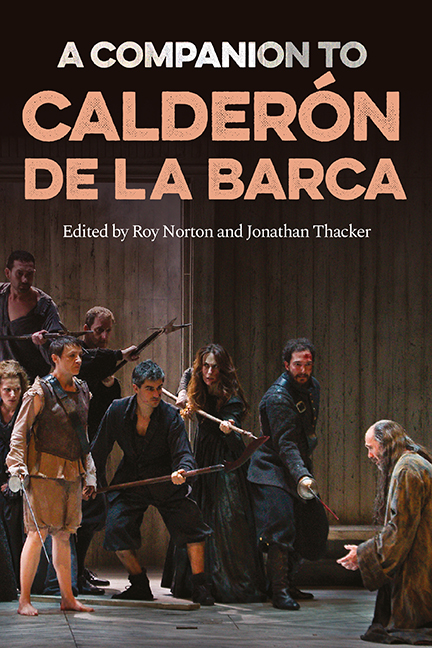Book contents
- Frontmatter
- Dedication
- Contents
- List of Illustrations
- List of Contributors
- Acknowledgements
- List of Abbreviations
- Introduction
- 1 Biography and Context
- 2 The Calderonian World
- 3 The Playwright’s Craft: Calderón and the Great Theatrical World of Early Modern Spain
- 4 La vida es sueño
- 5 The Honour Plays of Calderón
- 6 Calderón, the Comedian
- 7 Mythological Court Spectacle Plays
- 8 Religious comedias
- 9 Calderón’s ‘Sacramental, Allegorical and Historical’ autos
- 10 Calderón’s graciosos
- 11 Calderón and Visual Art
- 12 The Staging of Calderón’s Theatre
- 13 Calderón’s European Reception from Romanticism to the Twentieth Century
- 14 The Reception of Calderón in the Hispanic World
- Appendices
- Consolidated Bibliography
- Index
- Tamesis • Companions
8 - Religious comedias
Published online by Cambridge University Press: 07 October 2022
- Frontmatter
- Dedication
- Contents
- List of Illustrations
- List of Contributors
- Acknowledgements
- List of Abbreviations
- Introduction
- 1 Biography and Context
- 2 The Calderonian World
- 3 The Playwright’s Craft: Calderón and the Great Theatrical World of Early Modern Spain
- 4 La vida es sueño
- 5 The Honour Plays of Calderón
- 6 Calderón, the Comedian
- 7 Mythological Court Spectacle Plays
- 8 Religious comedias
- 9 Calderón’s ‘Sacramental, Allegorical and Historical’ autos
- 10 Calderón’s graciosos
- 11 Calderón and Visual Art
- 12 The Staging of Calderón’s Theatre
- 13 Calderón’s European Reception from Romanticism to the Twentieth Century
- 14 The Reception of Calderón in the Hispanic World
- Appendices
- Consolidated Bibliography
- Index
- Tamesis • Companions
Summary
In his long diatribe against the ‘comedias que agora se usan’ [plays that are fashionable nowadays], which he considered just as ignominious as chivalric romances, the priest in the First Part of Don Quijote alludes to ‘comedias divinas’ [religious plays] with clear disdain: ‘¡Qué de milagros falsos fingen en ellas, qué de cosas apócrifas y mal entendidas, atribuyendo a un santo los milagros de otro!’ [Look at the false miracles and other apocryphal and ill-understood things they relate, attributing the miracles of one saint to another!]. We can deduce from the reference to saints that he is referring specifically to hagiographical works, one of the types of religious comedia. This genre also includes biblical plays, based on stories drawn from the Old Testament; those that venerated the Virgin Mary (comedias marianas), and those that tell the tales of sinners, generally bandits, who in spite of their sins and vices, manage to find salvation thanks to their faith. Calderón took inspiration from the first books of the Bible in the writing of some of his dramas, such as in Los cabellos de Absalón [The Hair of Absalom]; he staged the lives of saints, such as in El mágico prodigioso [The Marvellous Magician]; he exploits a Marian legend in La aurora en Copacabana [Dawn in Copacabana], and he shows how even the most wicked of sinners can obtain salvation in La devoción de la cruz [Devotion to the Cross].
Religious themes are by no means exclusive to Baroque theatre: a great deal of medieval French theatre, as well as Spain's sixteenth-century farsas and autos, treat biblical and hagiographical subject matter. Indeed, the commemorative and cele-bratory works performed in Jesuit colleges notably took martyrs as their protago-nists: the famous Tragedia de San Hermenegildo [Tragedy of St Hermenegild], first performed in Seville in 1590, serves as an example. Calderón, who was educated at the Jesuit Colegio Imperial in Madrid, will undoubtedly have had the opportunity to attend this kind of performance. The counter-Reformation increased the presence of religious themes in the theatre even more; plays were considered a valuable means of communicating religious ideas to the public.
- Type
- Chapter
- Information
- A Companion to Calderón de la Barca , pp. 154 - 171Publisher: Boydell & BrewerPrint publication year: 2021



